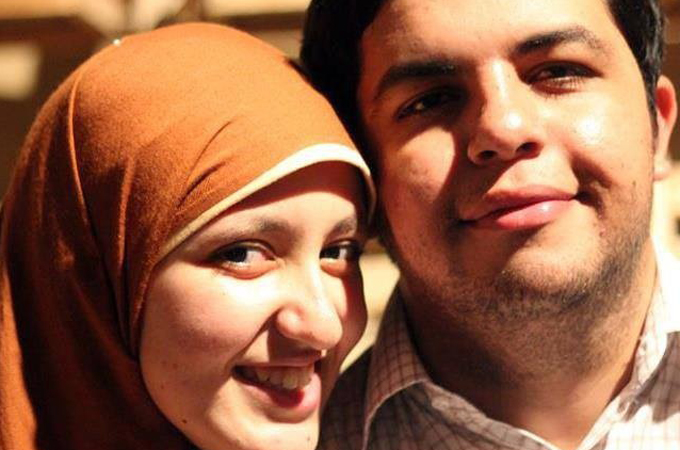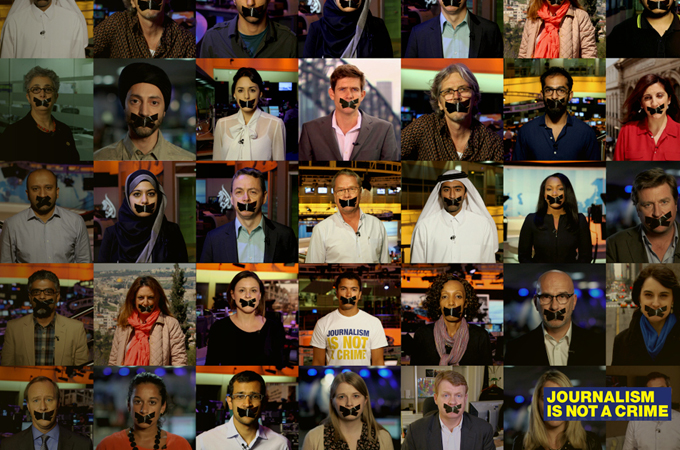Locked up on World Press Freedom Day
Harassment, threats, imprisonment, and murder continue to plague the journalism profession.

They’d been waiting for months to see the evidence against them. But when it came, in the fifth session of their trial, the videos – supposed to prove that three Al Jazeera journalists were guilty of smearing Egypt’s reputation, doctoring footage, and helping terrorists – were downright bizarre.
The clips included footage of a trotting horse, taken from Sky News Arabia; another was a press conference in Nairobi; a third was a BBC documentary about Somali bandits.
Keep reading
list of 4 itemsUK court to rule on Julian Assange extradition appeal: What could happen?
Georgia’s president vetoes controversial ‘foreign agents’ bill
‘Regime machinery operating efficiently’ as Tunisia cracks down on dissent
It would be laughable were it not for the fact the three journalists in question – Egyptian producer Baher Mohamed, Australian correspondent Peter Greste, and Egyptian-Canadian bureau chief Mohamed Fahmy – are still behind bars. Despite widespread international condemnation and pressure going as high as the Australian prime minister, the trial – which also includes 17 other journalists, some being tried in absentia – continues.
On Saturday, World Press Freedom Day, Greste, Mohamed, and Fahmy will have been imprisoned for 126 days. Al Jazeera Arabic’s Abdullah ElShamy has been jailed since August, and has been on a 103-day hunger strike to protest his detention without charge.
Pretrial detention is a punishment that the government uses to silence the journalist and because of this policy, a lot of journalists question whether they should cover events.
Of course, they’re not the only journalists jailed for doing their jobs. The Committee to Protect Journalists (CPJ) census of journalists in prison found 211 confirmed cases of media workers locked up as a direct result of their work, making 2013 the second-worst year on record. Turkey, Iran, and China accounted for more than half of all cases.
“Imprisonment can be through the explicit criminalisation of free speech – through, for instance, defamation laws – or through other charges like spying or drug trafficking,” explains Melody Patry, advocacy officer at Index on Censorship.
‘Subversion and terrorism’
One allegation used frequently by authoritarian regimes seeking to silence critical news coverage is that such reports are “anti-state”. Of the 211 imprisoned journalists logged by CPJ, 124 were held for “subversion and terrorism” – many more than for charges such as defamation or libel. In 45 cases, no charges were disclosed at all.
Inevitably, some countries get more attention than others. Partly because of the charges against foreign Al Jazeera staff, and partly because of a tumultuous political situation placing the country high on the international news agenda, press freedom in Egypt has been a major story.
The CPJ has confirmed the cases of 17 jailed journalists who it can name. Sherif Mansour, CPJ’s Middle East and North Africa programme coordinator, said further cases were not included because the journalists in question did not want the details of their charges made public, in case the extra attention “complicates” the proceedings against them.
In Egypt, more than 20,000 people have been rounded up and detained since July 2013, when Morsi was deposed.
“Out of this number, we have monitored and documented over 60 journalists who were detained, and out of those, most of those have been freed without charges,” says Mansour. “The rest, the 17 people, are kept without charges. So far, only one has received a court verdict, a one-year sentence.”
‘Silenced’
Analysts say such arrests allow the government to exert influence over journalists. “We say that when a journalist is imprisoned, dozens are silenced,” says Mansour.
 |
| Gehad Khaled with her husband Abdullah ElShamy, the jailed Al Jazeera Arabic correspondent [Al Jazeera] |
“Pretrial detention is a punishment that the government uses to silence the journalist and because of this policy, a lot of journalists question whether they should cover events. Many international journalists have left and more organisations are thinking of this when they send their correspondents to the region.”
This can lead to self-censorship, a chilling effect that is certainly not unique to Egypt. “There is always a deterrent factor,” says Patry.
“You are telling people that journalists who criticize the government will end up in jail. Now that the definition of a journalist has been blurred by Twitter, Facebook, and blogging, this chilling effect has an even more far-reaching effect. Some countries that we consider to be established democracies, such as India and Brazil, have arrested individuals for Facebook posts.”
To mark World Press Freedom Day, CPJ has released a list of 10 imprisoned journalists whose stories make for sobering reading.
Uzbek editor Muhammad Bekjanov has been in jail for 15 years, one of the longest sentences for any journalist worldwide. Prominent Iranian journalist Siamak Ghaderi, imprisoned in 2010, has been beaten and whipped in custody. Vietnamese blogger Nguyen Van Hai is serving a 12-year jail term and, according to his family, could barely walk or talk during a prison visit in July 2013.
Patry draws attention to Azerbaijan, a country that has more than 100 political prisoners – including journalists – but struggles to attract any international attention. So why do some jailed journalists such as the Al Jazeera staff manage to attract major petitions and campaigns, while others languish in jail for decades?
At least part of the reason is simply to do with media momentum. “Some conflicts and places are judged to be more newsworthy,” says Patry. She also points out that Western governments may be reluctant to speak out about the way certain countries – such as China and Russia – treat journalists because of diplomatic, political, and economic concerns.
Indeed, there is a question mark over the extent to which the international community can help journalists imprisoned for their work.
 |
| Peter Greste, Mohamed Fahmy, and Baher Mohamed [-] |
UNESCO – which initiated World Press Freedom Day – has “ongoing communications with government actors in countries like Pakistan, South Sudan, Nepal, Guatemala, Honduras and Brazil,” said Guy Berger, director of its Division of Freedom of Expression and Media Development.
It holds meetings with media and NGOs as well as other UN agencies to highlight the best ways to protect reporters.
Deadly threats
Imprisonment is not the only risk facing journalists worldwide. Some of the most dangerous countries for journalists are places where arrests and detention are not the means of censorship – targeted killings are.
Pakistan, which consistently ranks as one of the world’s most dangerous places to be a journalist, has been in the news recently after a series of attacks on high profile reporters. On March 28, liberal writer and broadcaster Raza Rumi was shot. He survived but his driver died.
On April 19, prominent TV anchor Hamid Mir was seriously wounded in Karachi. He pointed the finger at the country’s spy agency, the Inter-Services Intelligence (ISI), a highly unusual move in a country where the ISI is seen as all-powerful and unassailable.
A recent report by Amnesty International suggests the ISI is involved not just in killings but kidnappings and harassment. It says these incidents “follow a familiar pattern that starts with threatening phone calls and escalates into abductions, torture, and other ill-treatment”.
Where do you run to when it is the authorities that are your persecutors? Nobody should be locked up for doing their job. If we reporters cannot tell the truth, then who will?
Across the board, it remains difficult for organisations such as UNESCO to monitor cases of detained or murdered journalists worldwide, and Berger points to the media as “playing the primary role of bringing cases to light and doing follow up coverage”, thereby providing information for NGOs and the UN to analyse.
But many cases are underreported, not just because of safety concerns for the individuals involved, but because states are secretive about abuses. All of this adds to a situation where it is difficult to hold authorities to account.
“It can be frustrating campaigning on these issues and not knowing when governments will respond to international pressure,” says Patry. “But from speaking to journalists who have been imprisoned and to their families, they say that it is useful to keep talking about it, because it makes them feel they are not alone.”
While many factors – including militant violence and other intimidation from non-state actors – affect global press freedom, state harassment and legal persecution are a vital part of the picture.
“Where do you run to when it is the authorities that are your persecutors?” said one Pakistani journalist, who asked to remain anonymous after he was imprisoned briefly by the ISI last year.
“Nobody should be locked up for doing their job. If we reporters cannot tell the truth, then who will?”